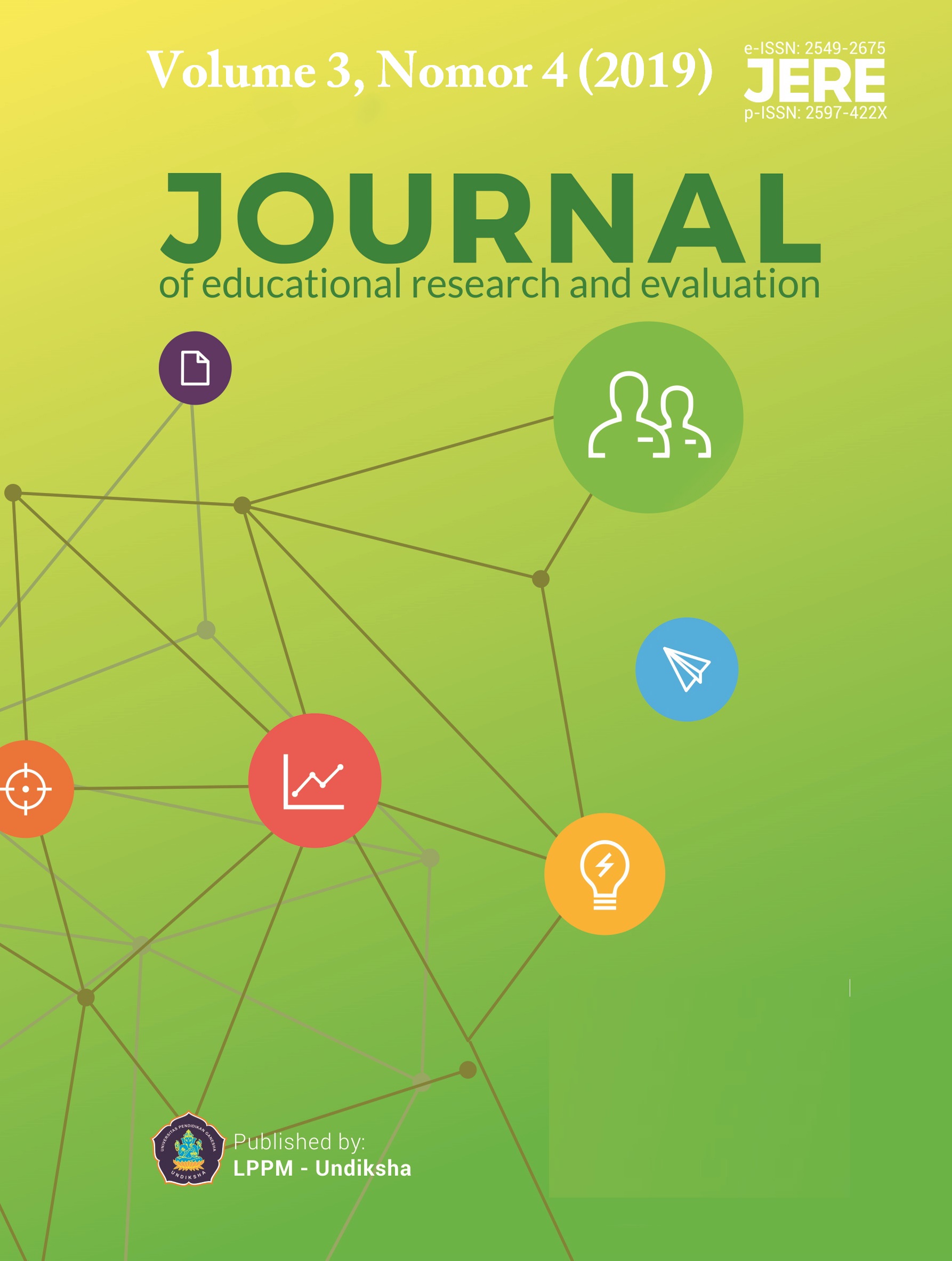Profile Evaluation in Indonesia: The Encouragement of Educational Change Facing The Era of Digitalism
DOI:
https://doi.org/10.23887/jere.v3i4.22355Kata Kunci:
Education, Change, EncouragementAbstrak
Education contribution to the formation of the style and quality of the future of human civilization can not be denied again. Education conventionally until the modern age was still believed to be a strategic location to expand the horizons and to provide the most valuable information about the meaning and purposing of life as the norm was taken. It needed that were essential to face the challenges of the changes in the future to create individuals, communities, and nations. While education digitalism was a very effective system to improve the quality of human life in all aspects of human life, education presented conscious efforts. Encouragement of education not only in preparing personnel professional teachers in their field but also encouraged prepared proteges facing to change towards conventional for digitalism. A fundamental change in the framework of preparing students was: change's ideology, self-control, futuristic effect, meaning in life.
Referensi
Agus, A Aco. 2016. “RELEVANSI PANCASILA SEBAGAI IDEOLOGI TERBUKA DI ERA REFORMASI A. Aco Agus Fakultas Ilmu Sosial, Universitas Negeri Makassar.” Jurnal Office 2(2): 229–38. http://ojs.unm.ac.id/jo/article/download/2958/1608.
Binti Ida Umaya. 2017. “No Titleالابتزاز الإلكتروني.. جرائم تتغذى على طفرة «التواصل ال.” Universitas Nusantara PGRI Kediri 01: 1–7. http://www.albayan.ae.
Campbell, James. 2016. “Democracy and Education: Reconstruction of and through Education.” Educational Theory 66(1–2): 39–53.
Fadillah, Galih Fajar. 2013. “Upaya meningkatkan pengendalian diri penerima manfaat melalui layanan bimbingan kelompok di balai rehabilitasi mandiri semarang.”
Fridayanti, Fridayanti. 2013. “Pemaknaan Hidup (Meaning in Life) Dalam Kajian Psikologi.” Psikologika: Jurnal Pemikiran dan Penelitian Psikologi 18(2).
H. Dadang Supardan. 2016. “Teori dan Praktik Pendekatan Konstruktivisme dalam Pembelajaran.” Edunomic 4(1): 1–12.
Indonesia, Pendidikan D I. 2015. “Leksi metafisika pancasila).” V(2): 832–42.
Kivisto, Hanna. 2018. “Capital as power and the corporatisation of education.” Critical Studies in Education 59(3): 313–29.
Ochoa Delarriva, Ornella, dan Enrique Alejandro Basabe. 2015. “Reading Logs and Literature Teaching Models in English Language Teacher Education.” How 22(2): 37–53.
Ornstein, Allan C., dan Daniel U. Levine. 2008. Foundations of Education (10th Edition).
P. Pannen, Dina Mustafa, dan Mustika Sekarwinahyu. 2001. “Konstruktivisme Dalam Pembelajaran.” Konstruktivisme Dalam Pembelajaran: 1–25.
Psikologi, Buletin. 2015. “Kajian Psikologis Kebermaknaan Hidup.” Buletin Psikologi 14(2): 115–35.
Pujawan, Kadek Agus Hendra. 2018. “the Development of Interactive Multimedia With Drill and Practice Model on Multimedia Ii (Two Dimention Animation) Course in Politeknik Ganesha Guru.” Journal of Education Research and Evaluation 2(1): 22–27.
Sumarsih, Sumarsih. 2009. “Implementasi Teori Pembelajaran Konstruktivistik Dalam Pembelajaran Mata Kuliah Dasar-Dasar Bisnis.” Jurnal Pendidikan Akuntansi Indonesia 8(1): 54–62.
Wei, Zhao, dan Michael A. Peters. 2019. “‘Intelligent capitalism’ and the disappearance of labour: Whitherto education?” Educational Philosophy and Theory 51(8): 757–66. https://doi.org/10.1080/00131857.2018.1519775.
Yahaya, Azizi et al. 2008. “Psikologi Pendidikan.” : 324.1385. “No Titleفرهنگ و رسانه های نوین.” http://www.ghbook.ir/index.php?name=فرهنگ و رسانه های نوین&option=com_dbook&task=readonline&book_id=13650&page=73&chkhashk=ED9C9491B4&Itemid=218&lang=fa&tmpl=component.
Unduhan
Cara Mengutip
Terbitan
Bagian
Lisensi
Authors who publish with the Journal of Evaluation and Research in Education (JERE) agree to the following terms:
- Authors retain copyright and grant the journal the right of first publication with the work simultaneously licensed under a Creative Commons Attribution License (CC BY-SA 4.0) that allows others to share the work with an acknowledgment of the work's authorship and initial publication in this journal.
- Authors are able to enter into separate, additional contractual arrangements for the non-exclusive distribution of the journal's published version of the work (e.g., post it to an institutional repository or publish it in a book), with an acknowledgment of its initial publication in this journal.
- Authors are permitted and encouraged to post their work online (e.g., in institutional repositories or on their website) prior to and during the submission process, as it can lead to productive exchanges, as well as earlier and greater citation of published work. (See The Effect of Open Access)











